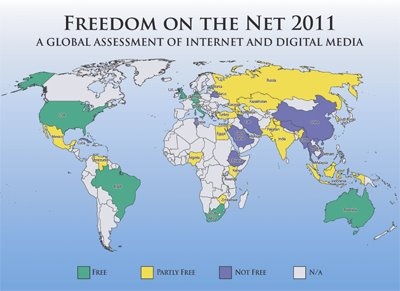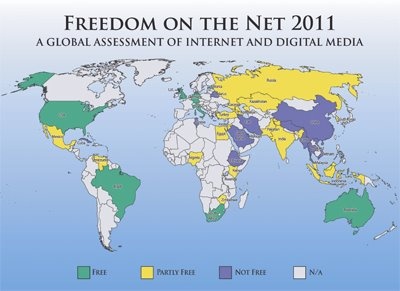

“…usage of social networks as mainstream production, distribution, and experience platforms may not be as extraordinary as the introduction of Gutenberg’s invention, but it is allowing us to experience media in radically new ways. In most cases, however, it still falls short of creating a genuinely human experience.” From Kevin Foote’s worthy article
“gutenberg’s printing press and a musician’s world tour.”
The democratization of books and learning was feared by many and some of the then elitist sought to suppress/control it – owning a printing press in some jurisdictions was made more difficult than owning a handgun in London today. Of course, the controls gradually crumbled, in part because books and printed material could be transported across borders.
There are again efforts to try to stifle the newest innovation to communication – the Internet. Some artists are legitimately concerned about piracy of their work. However, it is notable that those who peddle music or film or books or other art-forms in the old media way are most behind the effort – see SOPA/PIPA and Rupert Murdoch – to curtail the rapid development of the Internet as an artistic and commercial medium. The art will stand on its own. New forms will rise but the towers of old media will not necessarily crumble but just may be surpassed by new cresting methodologies, some foreseen, but others not yet visible from our perspective.
The Guttenberg Printing Press was originally employed to print the bible (something people were told not to read but listen to their priest for interpretation/definition); however over a long period of evolution newspapers and political manifestos began to seed ideas and knowledge. “Common Sense” gave popular rise and accessibility to the rooting of Enlightenment Age ideas that our brilliant American Founding Fathers implanted in the 13 Colonies.
Part of the panic of the static media peddlers is economic, but for much of the old order, political and business, it is also about the control of ideas. Under the guise of every thing from terrorism to piracy, from Kazakhstan to China, there are demands for the United Nations and/or new multilateral institutions to “regulate the dangers” of the Internet. Luckily, most in the international community are less inclined to control and more committed to further Internet freedom. While danger to person and security does exist on the Internet, I fear losing the opportunity of new ideas more than the bomb-maker who is still seeking to espouse old controls and fears over the same medium – ultimately in a true marketplace of ideas, that which promotes life and imagination and freedom will prevail.
To pick up Kevin Foote’s article: while the net allows “us to experience media in radically new ways. In most cases, however, it still falls short of creating a genuinely human experience.” Kevin cited
Daria Musk’s (singer/songwriter) New Years eve concerts as part of the evolution/revolution moving the Internet from new experience to intimacy with artist. Like many emerging artists, she has not only no fear but is embracing the medium as the new way to deliver art and connect.
Unlike books, papers, radio, television and film in traditional media format, on the Internet it is reincarnated with potential for transfer of ideas/information in both or more accurately multiple directions. The evolution is by no means complete or even beyond the early stages of vertebrate development necessary for all the neurons to connect.
At Diplomatically Incorrect, we herald the opportunity as “Voice of the Global Citizen”. However, this not mere rhetoric like on the mast of a mass circulation daily but takes life with each evolution.
By Ambassador Muhamed Sacirbey
Facebook Become a Fan at “Diplomatically Incorrect”
Twitter – Follow at DiplomaticallyX
FOLLOW mo @MuhamedSacirbey
Diplomat-Artist Channel





